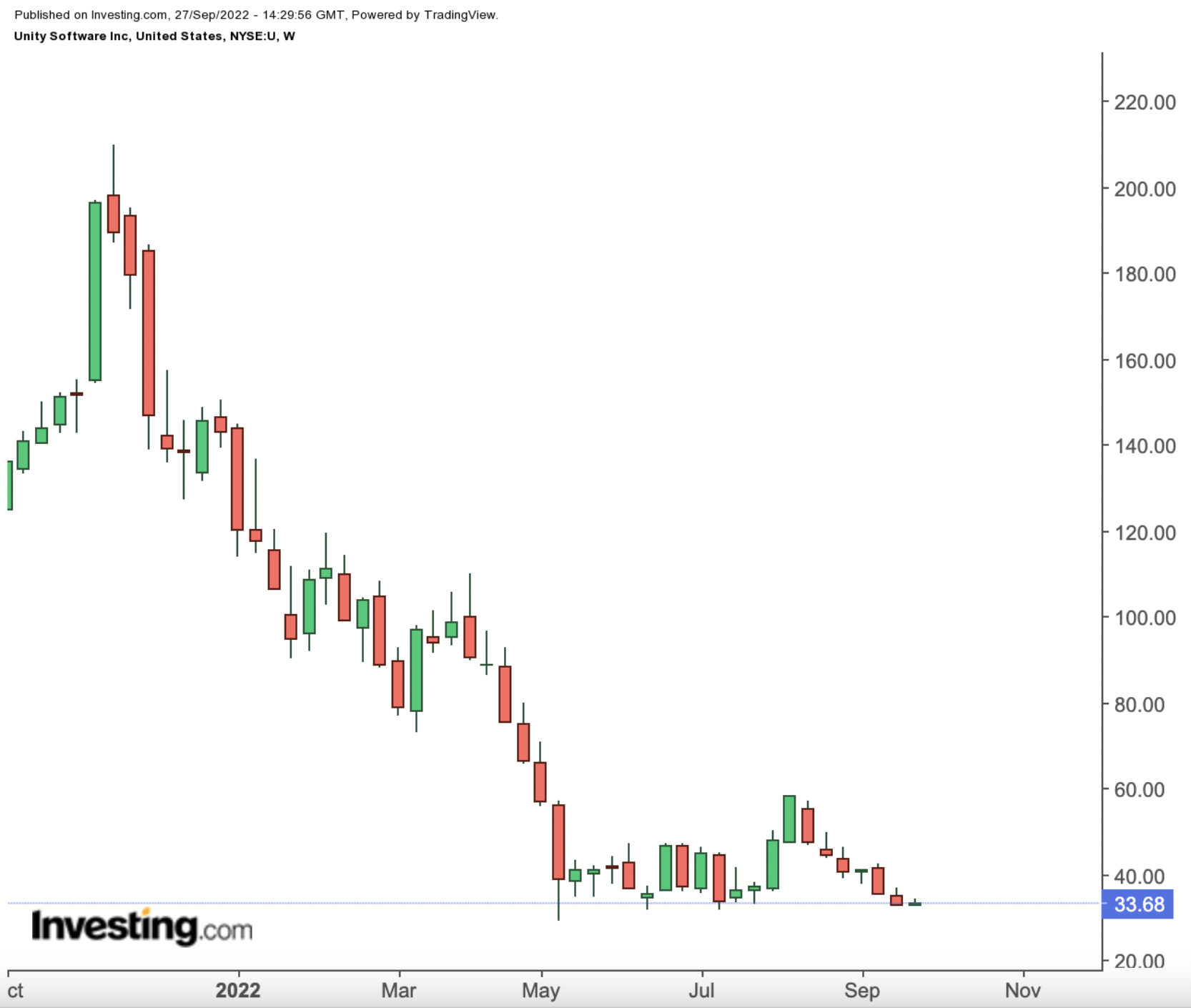e.l.f. Beauty stock plummets 20% as revenue and guidance fall short of expectations
- U stock has been one of the biggest victims of the growth sell-off, plunging 84% from November highs
- The ironSource deal makes some sense, and there's reason for long-term optimism
- But even hitting 2024 targets suggests Unity stock is a decent, but not spectacular, buy
A little over two years ago, Unity Software Inc. (NYSE:U) went public. The IPO was priced at $52. By December, U stock traded at triple that level. Renewed buying interest late last year pushed the stock briefly above $200. It closed Monday below $33.

Source: Investing.com
As with so many growth stocks, the question is whether the steep decline in recent months is an opportunity — or simply a correction. There's a reasonable case for both arguments.
Unity unquestionably is an attractive business, with a large long-term opportunity. Yet, it says something about what the 2021 market looked like that, even 84% below its highs, Unity stock is not necessarily cheap.
From here, the correct answer is somewhere in the middle. U stock has fallen far enough to get interesting — but not far enough to be compelling.
The Opportunity For Unity
At least some of the decline in U stock since November has come from significantly lower optimism toward the so-called "metaverse." In January, one analyst called U a "best Idea" owing to its position as "one of the key contributors to the development of the metaverse." Five months later, another analyst rated the stock a sell, with a price target of $27, citing fading metaverse hype.
Clearly, investor optimism toward the potential for immersive experiences has dimmed. Meta Platforms (NASDAQ:META) is investing billions in the effort — and has been rewarded with a 59% year-to-date decline for its work. But Unity has a real business beyond the metaverse.
The company's Create Solutions tools, including its flagship editor, are used to create compelling content. Unity is known as a gaming supplier, but in the second quarter 40% of revenue came from outside that industry. In fields like architecture, engineering, and media, Unity's ability to help create impressive 3-D content is of value. Create Solutions grew revenue a sharp 66% year-over-year in Q2.
The pending acquisition of ironSource (NYSE:IS) seems wise as well. The two businesses are nicely complementary: developers can create content with Unity's tools, and market that content with ironSource products.
And one benefit of the lower Unity share price is that the all-stock deal is getting cheaper. ironSource agreed to get taken out at a valuation of roughly $4.4 billion. At the current U stock price, however, Unity is only issuing about $3.5 billion worth of stock.
Two Big Risks To The Business
That's the good news. But there are two big concerns.
The first is that Unity has erred badly with what it calls its Operate Solutions business. That business — which competes with ironSource, which Unity is acquiring, and AppLovin Corporation (NASDAQ:APP), which tried and failed to buy Unity — helps publishers monetize their games. But "bad data" in the model, along with an accuracy error in measuring audiences, led customers to flee and revenue to decline 13% year-over-year in the second quarter.
Unity has said it fixed the problems, but the effects are likely to linger for several quarters. That aside, Unity also is facing pressure on the broader gaming industry, where engagement appears to have declined as the world returns to normal.
IronSource should heal some of the self-inflicted wounds in Operate Solutions. Non-gaming revenue should offset apparent gaming weakness, allowing Unity to drive overall revenue growth. But the catch, even at $32, Unity still is pricing in a good amount of growth.
Is Unity Stock Still Expensive?
After all, based on this year's guidance, Unity still trades at an enterprise value to revenue multiple above 7x. In that context in this market, that's not terribly cheap: AppLovin is in the same range when looking solely at its software business. (AppLovin also generates revenue from games it owns, but that revenue is likely to run off over time.)
Even assuming the ironSource merger is a success, there are worries about valuation. The combined company will have an enterprise value of about $13 billion post-merger; Unity is targeting $1 billion in EBITDA (earnings before interest, taxes, depreciation, and amortization) in 2024. That suggests a 13x EBITDA multiple and probably something in the range of 25x free cash flow. Both multiples are attractive given the long-term growth potential.
But, again, that target assumes the merger is a success — which is not at all guaranteed to be the case. And there's another catch: that $1 billion figure excludes share-based compensation.
Stock issued to employees is a real expense, even if it's a non-cash expense. Unity has booked $221 million in stock-based comp just in the first half of the year, a $440 million run rate. Assuming the figure grows post-merger (as is likely), free cash flow accounting for stock issuance would likely be close to zero.
Again, there's a big long-term growth opportunity here. Unity doesn't have to be cash-flow-positive in 2024 to be a buy. But the fundamentals don't suggest U is a screaming buy. Unity and ironSource still have a lot of work left to do.
Disclaimer: As of this writing, Vince Martin is long shares of AppLovin.
